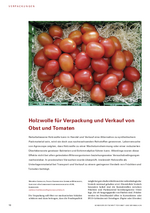Wood wool for the transportation and sale of fruit
Wood and wood wool products have been valued for their hygienic effects in wound treatment as early as in the 19th century and recent studies have shown the inhibitory effects of wood and secondary metabolites of wood on bacteria and fungi. Here, wood wool was evaluated as a tool to decrease microbiological decay of fruits in storage situations. The effect of wood wool on bacteria and fungi as well as the effect of wood wool on the microbiological decay of fruits was tested in vitro and in vivo. In vitro experiments showed that wood wool can reduce the survival rate of microorganisms. Additionally, an increased generation time of bacteria in the presence of wood wool could be measured. In vivo experiments using apples showed that the presence of wood wool reduces the number of fruits showing symptoms of microbiological decay whereas in other fruits such as strawberry, cherries apricots ant tomatoes no significant effects could be measured. In summary it was shown that wood wool has inhibitory effects on bacteria and fungi and that the application of wood wool can present technical difficulties masking possible inhibitory effects.Documents

|
Article: Wood wool for packaging and storage of fruits and tomatoes () |
Details
- Activity type
- Publication in technical journal
- Activity work package
- Fruit quality; improvement of fruit handling/storage
- Activity number
- Agroscope-WP4-A4
- Activity contact
- Andreas Bühlmann
Agroscope
Schloss 1
Postfach
8820 Wädenswil
Schweiz
Tel. +41 58 460 64 24
[email protected] - Activity partner
- AGROSCOPE
- Activity country
- Switzerland
- Last edit
- 23-07-2019

The EUFRUIT thematic network has received funding from the
European Union's Horizon 2020 research and innovation programme
under grant agreement No 696337.
European Union's Horizon 2020 research and innovation programme
under grant agreement No 696337.